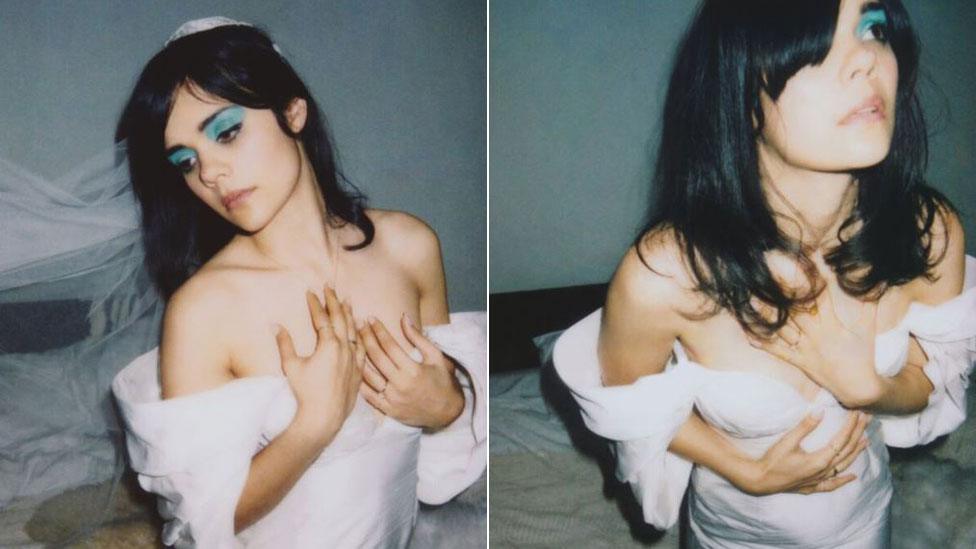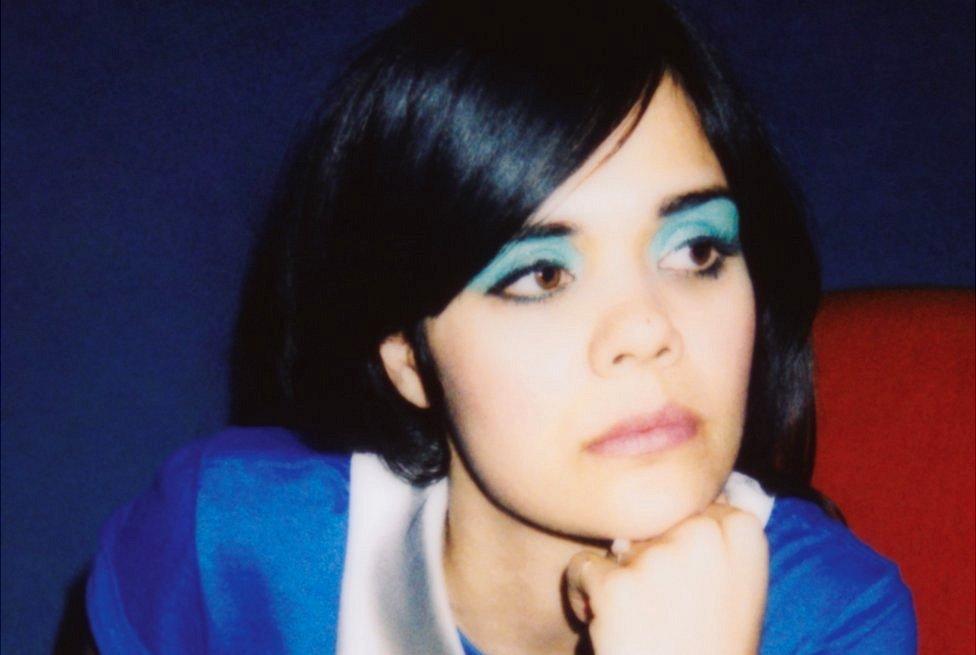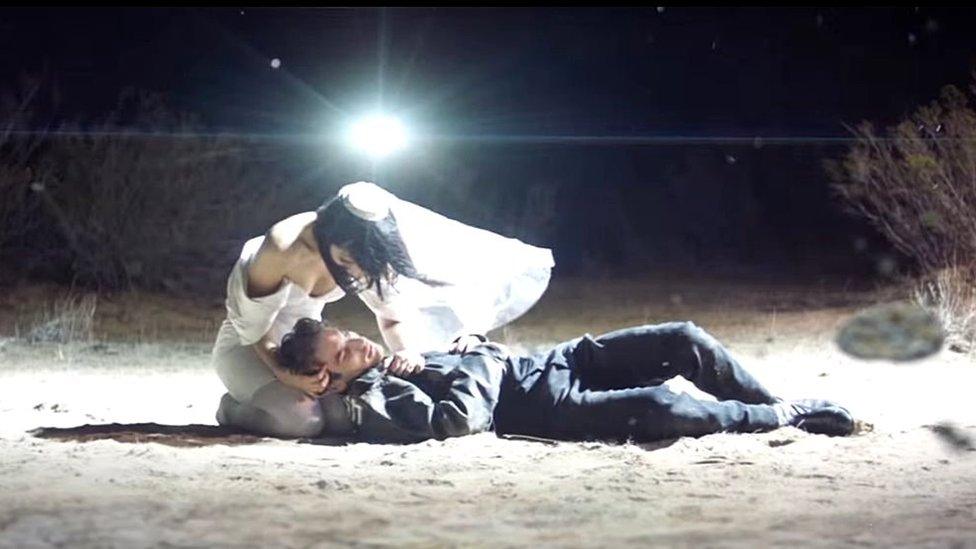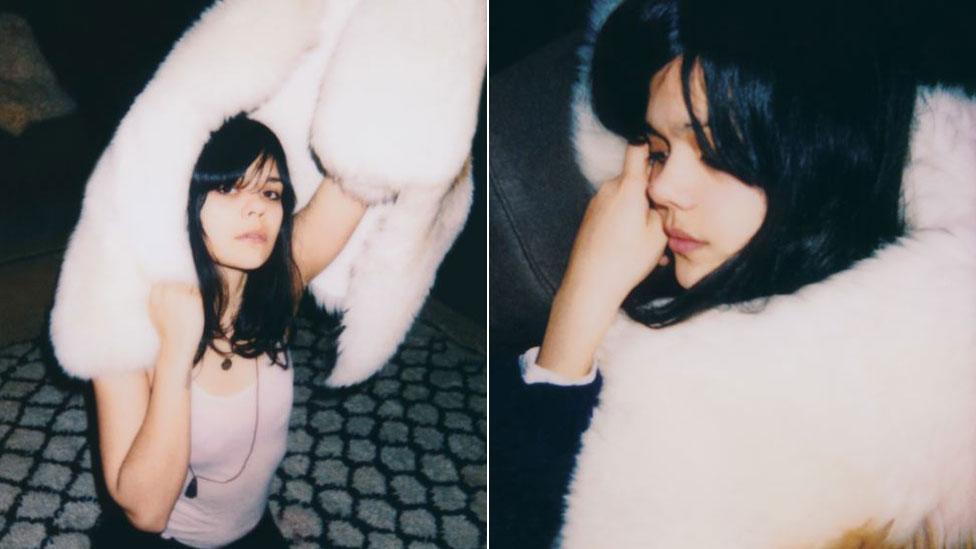Bat For Lashes: Til death us do part
- Published

Natasha Khan - aka Bat For Lashes - tells the tragic story of a would-be bride on her new album
"I cry my eyes out at every wedding," confesses Natasha Khan, who sings under the name Bat For Lashes. "I find them really emotional and really beautiful.
"I think getting married is the biggest heroic journey of all."
On her new album, The Bride, Khan finds herself crying at a wedding for entirely different reasons.
She plays the title character, a flawed heroine who discovers her groom has been killed on his way to the church. Devastated, she runs away in her honeymoon car, pursued by her own grief.
"I just love a tragedy," says Khan. "I love heartbreak as a vehicle for weaving through emotion.
"I was reading about scriptwriting at the time and in a short film, it's really good for something to happen in the first few minutes that sets the character off on a different course.
"So for me, it's this idea that this woman has found everything she ever wanted and what happens if that gets taken away? What happens if you had to take a honeymoon alone? Perhaps the only person you have to fall in love with is yourself."
This last point is key. On the album's opening track, I Do, The Bride sings: "Tomorrow, you will ask me if I do… and all of the sorrow will drop away."
"Real relationships aren't like that," Khan says. "Sometimes people, especially women, can look at the idea of marriage as something that's going to save them.

"I do believe in the spirit realm," says Natasha Khan
"We're fed that romantic ideal and I think it can be really dangerous. If you don't feel good about yourself, [marriage] is a dangerous path to tread."
Two tracks later, the fatal blow is dealt, and The Bride sinks to her knees in a disorientating blur of jagged synths.
"It felt like the best musical representation of panic and numbness and madness," says Khan. "It's quite psychedelic because when you have a trauma or you get really bad news, it's like an out-of-body experience.
"So that image of her falling to her knees could be really melodramatic and tacky. But it's really just a metaphor that I'm using to get to the heart of the matter - which is existential crisis and loss and grief."
But over the course of the album, The Bride never completely succumbs to sadness. On Widow's Peak, she makes the decision to fight back. "It's a moment where she could lose everything," says Khan, "when grief turns you into something you don't want to be, where it hardens your heart like a Miss Havisham character.
"That's the part where she could go to the dark side, but she doesn't."
Elsewhere, on the spooky, disquieting Close Encounters, she reconnects with her groom-to-be who "lays me down" on "the other side".
"In the film, it's a moment where they make love in the ether. She gets her wedding night, but it's kind of ghostly," Khan says.
Like that scene in Ghost?
"Sexy pottery will not be featured!" she laughs. "But I do believe in the spirit realm."
Candlelit concerts
The album took shape over two years, written as a soundtrack for a yet-to-be-made feature film.
To make The Bride come to life, Khan built up an extensive library of images, cuttings, diaries and reference material. The deluxe edition of the album even includes handwritten letters between the character and her fated fiance.

Bat For Lashes hopes the story will become a film, and is currently working on a script
She was assisted in this by photographer Neil Krug - best known for his collaborations with Lana Del Rey - who helped create visual references and, eventually, the pictures of Khan as The Bride that decorate the artwork.
"He's a very humble and quiet and gentle person," she says. "He does everything on an old Polaroid and then colours it, so it's a real labour of love. He'll spend hours cleaning the photographs of dust and he's got a very kind of analogue, organic process which I think, in this world of iPhones, is very rare."
To inhabit the role, Khan - who isn't married herself - had to acquire her first wedding dress.
"I didn't shop for one, I designed one, darling!" she deadpans. "The dress and the veil were very sexy and very rock and roll in some ways, because she's a hyper-real, pumped-up bride."
Khan has been wearing the dress again as she previews the album in its entirety at a series of candlelit church hall concerts, where the audience are encouraged to dress in their Sunday best
"The first night was the most nerve-racking thing I've ever done," she says. "I walked down the aisle and everyone stood up and turned around and clapped.

"If you experience loss early in life it can become a blueprint... fear that you're going to lose the people you love," says Natasha Khan
"It was such a heightened emotion to see it all coming together in reality - this thing that's been in my mind for so long. I felt like I was her, and it was a big weight to get into her headspace. To go through that emotional arc every night. That's why I'm not doing loads of shows."
But although The Bride project is high-concept, the music is breathtaking in its subtlety and depth. The Bride's loss is visceral, her emotional fallout pitch black.
It is quite possibly Khan's strongest work yet and, despite the fictional narrative, one of her most personal records.
"Singing as the character of The Bride helps me deal with a lot of emotions and feelings that are real, but within the context of storytelling," she told fans in a recent Facebook Q&A, external.
The 36-year-old won't get too specific about those feelings. "It's hard to talk about it without getting really personal," she says. "But both in separation and in death there's a feeling of abandonment and within that feeling comes anger, and yearning and all those similar emotions.
"I think if you experience loss early in life it can become a blueprint. You experience fear in relationships, or fear that you're going to lose the people you love."
It is possible the singer is referring to her parents' separation when she was 12, but she also talks about the losses sustained through death, or simply growing apart.
"Whatever it is, I think it's just part of being a human being. We come alone and we die alone and other people leave you. How do you cope with that and remain open-hearted?
"I find it really interesting, in today's climate of Tinder and all that, there's all these promises of romance and all this disenchantment.
"A lot of women friends of mine have become really hardened and cynical. When you're hurt enough times, it's really hard to keep your heart open."
The Bride, however, escapes this hardening of the heart.
"At the end, she looks back and says, 'Actually, I'm the person I am now because of that loss - and I've grown as a human being and I feel thankful.'
"I think that's the greatest love of all. Not worrying whether a person is with you or not - that ownership, ego thing. That's true love."
The Bride is out on Friday, 1 July on Parlophone Records.

Follow us on Twitter @BBCNewsEnts, external, on Instagram at bbcnewsents, external, or email entertainment.news@bbc.co.uk, external.